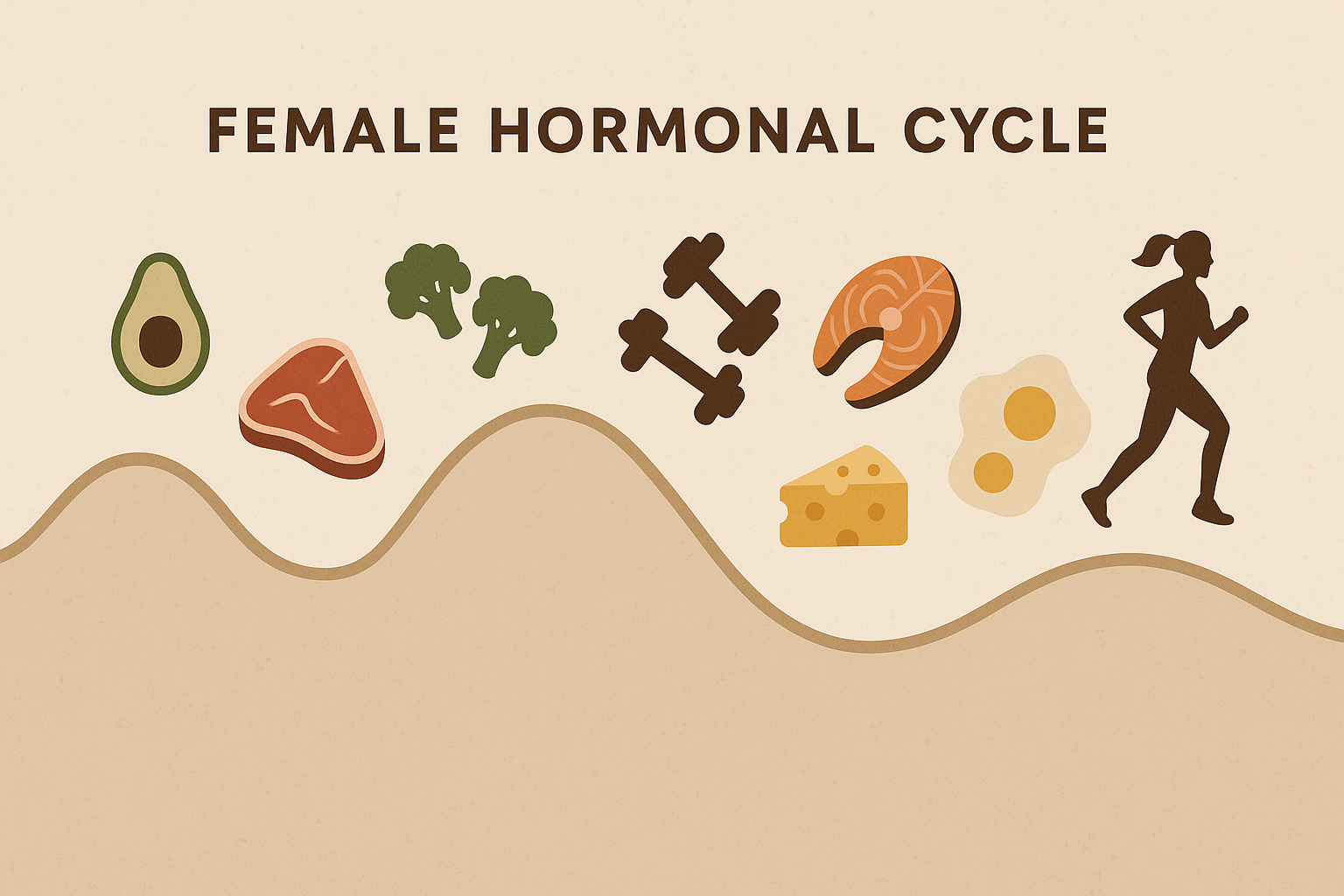The ketogenic diet's popularity continues to soar, praised for its benefits in weight loss, energy, and mental clarity, as outlined in the general Keto Beginner's Guide. But when it comes to keto for women, the conversation gets a bit more nuanced. Our intricate hormonal landscape means that keto might affect us differently than men, and understanding these differences is key to long-term success and well-being.
Let's be clear: women absolutely can thrive on keto! However, acknowledging potential interactions with our hormones and cycles allows us to tailor the approach for optimal results, avoiding common pitfalls.
Why Keto Might Affect Women Differently
Female physiology is beautifully complex, largely governed by the fluctuating interplay of hormones like estrogen and progesterone. These hormones influence everything from metabolism and appetite to mood and energy levels. Drastic dietary changes, like adopting a very low-carbohydrate ketogenic diet, can sometimes impact this delicate hormonal balance.
 Understanding how keto interacts with the female hormonal cycle is key.
Understanding how keto interacts with the female hormonal cycle is key.
- Hormonal Sensitivity: Some women find their bodies are more sensitive to significant carbohydrate restriction, potentially impacting thyroid function or stress hormone (cortisol) levels if not implemented carefully.
- Menstrual Cycle: Hormonal shifts throughout the monthly cycle can affect energy, cravings, water retention, and even insulin sensitivity, sometimes making strict keto feel more challenging at certain times.
- Life Stages: Hormonal changes during perimenopause and menopause add another layer of complexity to metabolism and body composition, influencing how keto might work.
Understanding these factors doesn't mean keto is off-limits; it means a mindful, personalized approach often works best for women.
Keto and Your Hormones
- Insulin: Keto's primary benefit is lowering insulin levels (a core concept explained in the Beginner's Guide), which is fantastic for improving insulin sensitivity – a common issue for women, especially with conditions like PCOS.
- Estrogen & Progesterone: The research here is still evolving. Some studies suggest keto may influence sex hormone levels, but effects vary greatly. Some women report improved cycle regularity, while others experience temporary changes, especially during the initial adaptation phase. Extreme calorie restriction or nutrient deficiencies (often unrelated to keto itself, but poor implementation - focus on nutrient-dense keto recipes) are more likely culprits for significant hormonal disruption than well-formulated keto.
- Cortisol (Stress Hormone): Any major dietary change can be a stressor initially. Very low carbs combined with excessive exercise or inadequate calorie intake could potentially raise cortisol for some women. Managing stress is crucial.
 Managing stress through activities like yoga is important for hormonal balance on keto.
Managing stress through activities like yoga is important for hormonal balance on keto.
Navigating Keto and Your Menstrual Cycle
Many women notice changes in their cycle when starting keto.
- Initial Irregularity: It's not uncommon to experience temporary changes (lighter, heavier, delayed, or early periods) during the first few months as your body adapts hormonally and metabolically. This usually normalizes.
- PMS Symptoms: Some women report improved PMS symptoms (less bloating, fewer mood swings) due to stable blood sugar and reduced inflammation. Others might find cravings intensify pre-menstrually.
- Energy Fluctuations: You might feel more energetic during certain phases (like the follicular phase) and potentially need more rest or slightly more carbs during others (like the late luteal phase).
Tips for Cycling Women:
- Be Patient: Allow 2-3 cycles for your body to adjust.
- Track Your Cycle: Note any changes in symptoms, energy, or cravings alongside your cycle phases.
- Consider Gentle Carb-Ups: Some women find adding a small number of extra healthy carbs (20-30g more, from sources like sweet potato or berries) for 1-3 days before their period helps manage cravings and energy dips without derailing ketosis long-term. This is highly individual and requires understanding your personal macros.
- Prioritize Magnesium: This mineral can help with cramps and sleep, and needs often increase pre-menstrually.
- Don't Undereat: Ensure adequate calorie intake, especially in the luteal phase when metabolism can slightly increase.
Keto During Perimenopause and Menopause
This life stage brings its own hormonal shifts (declining estrogen and progesterone) that often lead to changes in body composition (increased belly fat), insulin sensitivity, and metabolism. Keto can be a powerful tool during this time:
- Improved Insulin Sensitivity: Can help combat the increased insulin resistance common in menopause.
- Weight Management: May help manage the tendency towards weight gain, particularly abdominal fat.
- Stable Energy: Can counteract energy slumps associated with hormonal fluctuations.
- Brain Fog Relief: Many women report improved mental clarity.
Tips for Menopausal Women:
- Prioritize Protein: Crucial for maintaining muscle mass, which naturally declines with age and estrogen loss. Ensure you're meeting your target using a macro calculator.
- Focus on Strength Training: Helps preserve muscle and bone density.
- Manage Stress: Cortisol management is even more critical during this transition.
- Ensure Nutrient Density: Focus on whole, nutrient-rich foods.
- Be Patient with Weight Loss: Hormonal changes can make weight loss slower; focus on health improvements and body composition.
Specific Keto Tips for Women
- Don't Undereat: Chronic calorie restriction can negatively impact hormones. Focus on eating satisfying, nutrient-dense keto meals to satiety.
- Prioritize Sleep: Aim for 7-9 hours of quality sleep for hormonal balance and stress management.
- Manage Stress: Incorporate stress-reducing practices like yoga, meditation, walking, or journaling. High cortisol hinders fat loss.
- Mind Your Electrolytes: Women may be more prone to imbalances, especially around their cycle. Ensure adequate sodium, potassium, and magnesium. Magnesium is particularly important for sleep, mood, and managing cramps. Supplementing with a well-absorbed form like Magnesium Glycinate is often beneficial. (See our Common Keto Mistakes guide for more on electrolytes).
Magnesium Recommendation for Women: Bronson Magnesium Glycinate
Magnesium Glycinate, like this Bronson Magnesium Glycinate, is often preferred for women on keto due to its gentleness on the stomach and high absorption. It can be particularly helpful for supporting sleep quality, managing mood fluctuations, and potentially easing PMS symptoms or cramps.
Check Price on Amazon(Qunol also offers a well-reviewed Magnesium Glycinate.)
 Adequate electrolytes, especially sodium, are crucial for women on keto.
5. Listen to Your Body: Pay attention to your energy, mood, cycle, and hunger signals. Don't be afraid to make small adjustments (like timing meals, adding slight carb-ups if needed, adjusting fat/protein ratios).
6. Focus on Whole Foods: Minimize processed "keto" products and prioritize nutrient-dense meats, fish, eggs, healthy fats, and non-starchy vegetables. (Use our Keto Shopping List!)
7. Consider Thyroid Health: If you have pre-existing thyroid issues or suspect problems, work closely with your doctor when implementing keto.
Adequate electrolytes, especially sodium, are crucial for women on keto.
5. Listen to Your Body: Pay attention to your energy, mood, cycle, and hunger signals. Don't be afraid to make small adjustments (like timing meals, adding slight carb-ups if needed, adjusting fat/protein ratios).
6. Focus on Whole Foods: Minimize processed "keto" products and prioritize nutrient-dense meats, fish, eggs, healthy fats, and non-starchy vegetables. (Use our Keto Shopping List!)
7. Consider Thyroid Health: If you have pre-existing thyroid issues or suspect problems, work closely with your doctor when implementing keto.
Keto for women isn't about a completely different diet; it's about applying the principles thoughtfully, listening to your unique physiology, and making adjustments as needed to support your hormonal health and overall well-being throughout different life stages.
Ladies, what are your experiences with keto? Share your tips and questions below!

